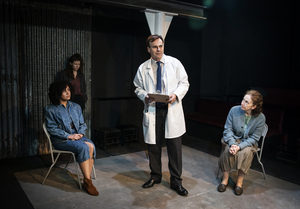Review: THE SUGAR HOUSE, Finborough Theatre
This Australian play promises much, but ditches many of its ideas in favour of a soapy family saga.

![]() History is shallower for Australians - white Australians - than it is for almost any other nationality. The past is closer to hand, more present, which might explain why its retention or destruction feels more personal, and why this play goes so quickly to concerns about how far the past can reach into the present. Such musings also go some way to explaining this play's key concept - bad blood - not, as it is in England, a synonym for a feud, but the idea that criminality can pass through generations. Put as bluntly as that, the idea seems related to eugenics, but that was not the author's intention I'm sure.
History is shallower for Australians - white Australians - than it is for almost any other nationality. The past is closer to hand, more present, which might explain why its retention or destruction feels more personal, and why this play goes so quickly to concerns about how far the past can reach into the present. Such musings also go some way to explaining this play's key concept - bad blood - not, as it is in England, a synonym for a feud, but the idea that criminality can pass through generations. Put as bluntly as that, the idea seems related to eugenics, but that was not the author's intention I'm sure.
We're in Pyrmont, a poor suburb of Sydney in the 1960s where June Macreadie's personality dominates her family. She rails against her daughter, Margo and receives aggression in return, favours her boganish son Ollie and dotes on her whip smart granddaughter, Narelle. June's passion is the abolition of the death penalty, her fear is the corrupt local police's predilection for stitch-ups and her anxiety is that her estranged brothers' violence will leak out of her into future generations. Bad blood you see.
As the time frame moves to 2007 and then back to 1985, we see how these themes develop, mainly through the eyes of Narelle. Class issues are never far away: increasing affluence fails to lead to increasing power for the Macreadie family and people like them; as many problems are created as solved by the gentrification of post-industrial Pyrmont after the 2000 Olympics; and Narelle's impostor syndrome almost derails her law career.
This is fertile ground indeed, but Alana Valentine chooses to narrow her play's perspective rather than extend it. Jessica Zerlina Leafe is excellent as the nine year-old Narelle, but she is limited to clichés as the rebellious punkish 80s student. Janine Ulfane's June is never less than credible, but we do not need to hear so much shouting to establish the fervour of her convictions. If that soapy move is director, Tom Brennan's, choice, Fiona Skinner spending the last 40 minutes or so in a hospital bed as Margo pushes the politics and ideas aside in favour of the kind of family trauma that is a staple of soaps the world over. That the socially specific becomes the sentimentally generic is on the playwright.
At two and a half hours, it's a long haul over such familiar territory, especially as there is so much promise in both the first half and the excellent programme. Ten thousand miles is a long way for a play to travel in order to tell us what we already know.
The Sugar House is at the Finborough Theatre until 20 November
Photo Pamela Raith
Reader Reviews

Videos

